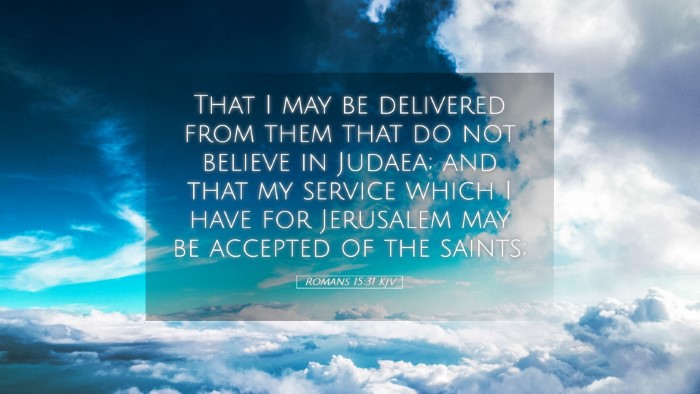Commentary on Romans 15:31
Romans 15:31 states:
"That I may be delivered from them that do not believe in Judea; and that my service which I have for Jerusalem may be accepted of the saints;"
This verse, nestled within Paul's epistle to the Romans, reflects the Apostle's concerns for both his mission and the safety of his ministry. Below is a consolidated commentary derived from public domain sources including Matthew Henry, Albert Barnes, and Adam Clarke.
Contextual Background
The context here is significant, as Paul is at a crucial point in his ministry. He is preparing to return to Jerusalem after gathering funds for the impoverished saints there. His journey is fraught with danger, particularly from those who oppose the gospel.
Historical Setting
-
Opposition in Judea: Paul had experienced intense persecution in Judea, a region dominated by Jewish unbelievers who vehemently opposed the gospel of Christ. This tension adds weight to his plea for deliverance.
-
Spiritual Undertones: Paul’s mention of his service suggests a deeper spiritual significance; he desires not just physical safety but that his labor might be fruitful and accepted by the believers in Jerusalem.
Thematic Insights
This verse encapsulates several key themes relevant to Christian ministry and the believer's life:
1. The Importance of Prayer
Paul’s request for prayer indicates the necessity of divine assistance. As commented by Henry, “Paul was a man of prayer, and he sought the prayers of the saints.” This highlights the communal aspect of faith and the dependence on God’s grace for perseverance in ministry.
2. Acceptance and Approval
In asking that his service may be accepted by the saints, Paul points to the desire for validation and acceptance. Barnes elucidates that it’s not enough to serve; the service must be seen as worthy by those it intends to benefit. This highlights a critical theological reflection on the way service is perceived within the body of Christ.
3. Deliverance from Unbelievers
The apostle's earnest prayer for deliverance from unbelievers emphasizes the ongoing spiritual warfare within ministry. Clarke notes that dwellers in the same region often misunderstand or mistreat the messengers of the Gospel. Paul’s experience serves as an encouragement to contemporary believers facing opposition.
Practical Applications
For pastors, students, theologians, and scholars, this verse encourages several practical reflections:
-
Dependence on God: All ministry efforts are dependent on God’s protection and guidance.
-
Responsibility to the Church: The work of ministry must consistently seek the approbation of the local church and its members.
-
Resilience in the Face of Opposition: The life of a believer is not without challenges, but God supplies grace for every trial.
Conclusion
In summary, Romans 15:31 is a profound testament to the challenges of apostolic ministry and the overarching need for communal prayer and support. Paul exemplifies a model for modern ministry, where reliance on prayer, striving for acceptance, and facing opposition with faith remain central elements of the Christian walk.


